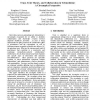Free Online Productivity Tools
i2Speak
i2Symbol
i2OCR
iTex2Img
iWeb2Print
iWeb2Shot
i2Type
iPdf2Split
iPdf2Merge
i2Bopomofo
i2Arabic
i2Style
i2Image
i2PDF
iLatex2Rtf
Sci2ools
84
Voted
HICSS
2003
IEEE
2003
IEEE
Trust, Trait Theory, and Collaboration in Telemedicine: A Circumplex Perspective
More than a process-automating tool, telemedicine is increasingly recognized for its ability to facilitate collaboration and knowledge creation between disparate healthcare providers. As trust is being demonstrated to affect positively the collaborative effort of practitioners and the concomitant, as well as subsequent impact on quality of health care delivery [1], the questions arise, What are the interpersonal traits of practitioners that contribute to a constructive and continuing telemedicine-centered collaboration? Furthermore, how do these interpersonal traits translate into specific types of interactions that maximize telecollaboration? These questions are especially germane as much telemedicine equipment remains underutilized, and administrators concern themselves with sustainability. Previous work has largely centered on relational variables affecting trust in collaboration, such as competence, reputation, and trustworthiness, but has neglected the personal characteristics th...
Biometrics | HICSS 2003 | Interpersonal | Interpersonal Interaction | Interpersonal Traits | System Sciences |
| Added | 04 Jul 2010 |
| Updated | 04 Jul 2010 |
| Type | Conference |
| Year | 2003 |
| Where | HICSS |
| Authors | Houghton G. Brown, Marshall Scott Poole, Thomas Lee Rodgers, Kim Van Walsum |
Comments (0)

